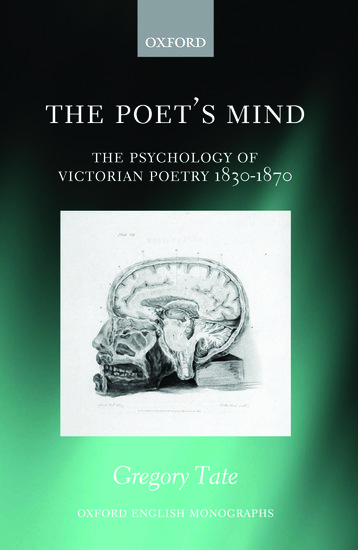
In November 2012 my first book, The Poet’s Mind: The Psychology of Victorian Poetry 1830-1870, was published by Oxford University Press. The book is an academic monograph, investigating a specific area of English literature which interests and enthuses me, and I’ve been working on the project, in different forms, for six years. At the end of such a substantial stretch of time, I’m pleased and also a little amazed to see the book in its final, finished form, because while the process has been consistently rewarding, it’s also been quite challenging at times.
The Poet’s Mind studies the ways in which Victorian poets – Alfred Tennyson, Robert Browning, Arthur Hugh Clough – write about psychology, and looks at the links between their writing and the work of scientific psychologists in the nineteenth century. The idea behind the book took a long time to germinate. I got hooked on poetry, and Victorian poetry in particular, when I was an undergraduate student, thanks to the guidance and encouragement of some inspirational lecturers. I knew, when I went on to postgraduate study, that I wanted to research and write a doctorate about how Victorian poets thought about the mind and subjectivity, but it wasn’t until another teacher suggested that I read some Victorian psychology that the idea for the project began to form in my head. The Victorian era saw the development of psychology in its modern form, as an independent scientific discipline, and it quickly became clear to me that there was a close and reciprocal relation between poetry and scientific psychology in the nineteenth century. Psychologists used poetic quotations as starting-points or evidence for their studies of mental processes, and poets incorporated new scientific theories of the mind into their literary analyses of psychology.
After this insight struck me, it took three years of full-time work, under two brilliant and supportive supervisors, to develop my basic ideas into a coherent argument, and to write and submit my doctoral thesis. After completing my doctorate and passing my viva examination, I then had to write a proposal explaining how I would revise my thesis for publication as a book, making it (hopefully) more interesting to a wider readership. Much to my delight, Oxford University Press accepted my proposal and agreed to publish the book, but I then had to revise and rewrite the thesis, and that was perhaps the hardest part of the whole process. I hadn’t worked intensively on the project for some time, and I found it difficult, even painful, to go back to my doctoral thesis, which I thought of as a finished piece of work, and make changes to it. There were some miserable days of writer’s block, when the ideas and the words just wouldn’t flow. This passed after a couple of weeks, though, and the writing of the book soon became smoother, and very enjoyable at times. Once I finished the writing, it was just a question of finding a cover image for the book, reading the proofs prepared by the publisher, and compiling an index. The editorial and production staff at Oxford University Press were efficient and supportive throughout the process, and the result is a finely made book.
Like Liam Murray Bell, who has recently completed his creative writing PhD here at the University of Surrey and published his first book, the novel So It Is, I’ve loved holding and looking through a physical copy of my book and seeing the final result of all that work. Of course I feel some pride at bringing the project to a successful conclusion, but I’m even more excited than I am proud; excited that the ideas which have been intriguing and fascinating me for the last few years are now out in the world, and that they will be read by, and might interest, other scholars, enthusiasts, and students.
